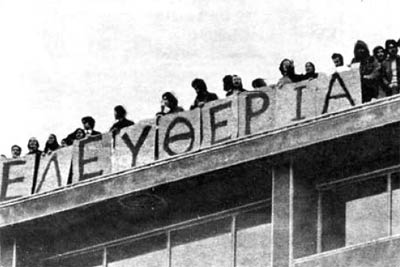
Yesterday, November 17, was a big day for #Occupy protesters across America, resulting in hundreds of arrests. For Greece, November 17 has special meaning in the fight for democracy and freedom. Kostas Kallergis, a freelance journalist from Athens who runs the blog When The Crisis Hits the Fan, gave The eXiled permission to cross-post his account of November 17.
ATHENS–November 17: a date that haunts Greece. It’s the date when the uprising of several hundred of students, who stood up against the military dictatorship by occupying the Athens Polytechnic, was brutally crushed. The iconic photo of a tank driving through the Polytechnic’s gate is a symbol of freedom for (probably) all Greeks.
It was back in 1973. The student uprising was crushed but the beggining of the end for the military junta begun that day. The colonels fell from power a year later, in the summer of 1974.
To describe how central this day is for modern Greeks one needs to mention a few simple facts.
- One of the characteristics that the new Greek state has (or had until recently) was the so called “university asylum”. It was an emotionally heavy (due to the Polytechnic uprising) law that officialy prohibited the police from entering any university building. From then onwards, the university compounds would be an area of free expression. In the decades that followed that law meant a lot of freedoms indeed, but few abuses as well. Police only stepped inside university areas after the local dean would ask the prosecutor for their presence. The freedom of speech boomed but Greek universities became at times a haven for different sorts of criminal activity (from rioters who caused mayhem and then hid in university buildings, playing hitch and hike with riot police, to people selling copied DVDs). In any case that law was so emotional for Greeks that, despite its occasional abuses, people were more or less supporting or tolerating it.
- Another illustrative fact is that the biggest terrorist organization in Greece was named after that date. November 17 aka 17N. It was the Greek version of Red Army Faction or the Red Brigades, a pure urban guerilla movement targeting individuals who were connected with the dictatorship or the establishment and was relatively popular, especially up until the end of the 1980s.
- The 1967-1974 dictatorship was one of those CIA sponsored coup d’ etats that were so popular back then. The American role behind the scenes would never wash away from our collective memory. Even today, people in the streets would tell you things like ‘The Americans are behind everything”. The first victim of 17N was Richard Welch, CIA’s station chief in Athens back in 1975. The last one was Stephen Saunders in 2000, he was the military attaché of the British Embassy in Athens. So you get the picture and now you know all about the infamous Greek anti-americanism. This is why the 17 November demonstration always begin from the Polytechnic and ends at the American Embassy.

The graffiti on the Polytechnic’s gate reads “Kick the USA Out” and “Kick NATO Out”
This year’s celebration for the 17th of November is a special anniversary. It’s not a round year number as the media people would suppose (it’s 38 years since November 1973). It’s special because last summer the Greek government passed a new Education law which abolished the “university asylum”. The law, which contains much more serious reforms to the Greek Higher Education system, was suspiciously passed at the end of August, a time of the year when, traditionally, important legislation is not discussed. Mysteriously, the abolition of the university asylum was discussed (and rejected) only 6 months earlier, but last August both PASOK and ND voted for the new Education Law. So this will be the first time we celebrate the day the abolished university asylum was inspired from. It practically also means that rioters cannot hide in university buildings any more. Of course police (and the government that is ordering the police) are not stupid enough to start wandering in university classrooms chasing rioters or trying to find an answer as to why they never managed to study anything.
Today there is no 17N. There is only the government to terrorize the citizens. After the “accept these measures or we’ll run out of money” blackmail we’ve been hearing a month before every new wave of austerity measures, they now try to scare people away from the demonstrations by leaking information or implyinh that there will be too much violence. The Minister of Citizen Protection (no, seriously, it’s not an Orwellian joke, that’s the official name of the former Ministry of Public Order), Mr. Christos Papoutsis, has informed us that there will be around 7.000 policemen in the streets of Athens patroling and preventing bad things from happening. A week earlier he has met the Deans from all Athens’ Universities in order to discuss how they will better protect this year’s celebrations.
It’s interesting to have a flash back here.
Christos Papoutsis was the president of the Greek National Union of Students between 1978 and 1980 and Deputy Secretary of PASOK Youth Movement for about the same period (1978–1981). From 1984 to 1995 he was a Member of the European Parliament and served as a EU Commissioner from 1995 to 1999. For many Greeks he belongs to the degenerated “Polytechnic’s generation”. This was the generation which participated in the uprising and who belonged, politically speaking, to the Left. A lot flirted with PASOK and became politicians in the 1980s and a lot from this lot also were corrupted by consecutive years in power. Although Papoutsis was never found guilty on corruption or embezzlement, Greeks didn’t forget (and some never forgave) the fact that as a Minister of Mercantile Marine he did not resign after the MS Express Samina disaster in 2000.
But there is another more impressive example of the so called Polytechnic’s generation. During the uprising the students, calling themselves the “Free Besieged” (a reference to a poem by Greek national poet Dionysios Solomos inspired by the Ottoman siege of the city of Mesolonghi in the 1820s), barricaded themselves in and, using laboratory equipment. constructed a radio station that repeatedly broadcast across Athens this message:
This is the Polytechnic! This is the Polytechnic! This is the radio station of the free struggling Greeks. Down with the junta, down with Papadopoulos (the junta leader), kick the Americans out, down with fascism, the junta will be brought down by the people… People, come out to the streets, come to support us and you will find your freedom…
The female voice of that message which was repeated over and over again belonged to Maria Damanaki. She was then a member of the Communist Youth (KNE). After the fall of the colonels’ regime, Damanaki became an MP with the Communist Party (KKE) and then with the more progressive Leftist party, Synaspimos (Coalition of the Left) of which she also became leader between 1991 and 1993. In 2003 she resigned from Synaspismos and when George Papandreou succeeded Costas Simitis to the leadership of PASOK (January 2004), she decided to join with him. That decision came despite the fact that after her departure from Synaspismos she had ruled out the prospect of her joining PASOK. After several years as a PASOK MP, Damanaki was nominated as the representative of Greece in the European Commission and on 27 November 2009 was appointed as the Commissioner for Maritime Affairs and Fisheries. Since the 1973 student uprising, this iconic figure of the Polytechnic generation has managed to travel across the political spectrum, from the communist left hardliners to the practically liberal PASOK. And, just recently, in May 2011, I was totally disappointed to see her participating in the blackmailing game of the government in order to pass another round of austerity measures. “Either we agree with our creditors on a programme of tough sacrifices and results, undertaking our responsibilities to our past, or we return to the drachma” she said, being the first senior Greek official to raise that possibility.

The Athens Polytechnic campus courtyard in the aftermath of the student uprising
Her statement shocked Greeks, a lot resigned from their objections, Athens saw the biggest demonstrations in decades, but the measures were passed as Memorandum No2. It didn’t sound as sweet as that young girl’s voice which was so thirsty for freedom. Here’s how sweet it was:
Another originality of this year’s celebrations is that, for the first time, the Minister of Education, Anna Diamantopoulou, will not visit the Polytechnic in order to lay a wreath in the memory of the students who died. The crowd would probably attack her physically not only because she is a member of this government but especially because she introduced the new Education law that caused so many reactions. And guess what! If she’d go, she wouldn’t be in a university asylum anymore. Anna Diamantoulou said in a statement: ”Respecting the Polytechnic means, above all, respecting the truth. And the truth is that, under the circumstances which have been created by the non-democratic actions of some dynamic minorities in the past years, there is absolutely no point to lay wreaths accompanied by either the police or the party supporters.”
As my friend Ioanna commented, “What’s her problem? Everywhere she is going, she is accompanied by cops or party dogs anyway.”

Students hold up letters reading “FREEDOM” from the Polytechnic rooftop
Kostas Kallergis is a freelance journalist in Athens. Read his blog When The Crisis Hits The Fan to learn more about what’s really going on in the birthplace of Western democracy.
Would you like to know more? Read Mark Ames’ “Austerity & Fascism in Greece: The Real 1% Doctrine.”
November 18th, 2011 | Comments (20)





















